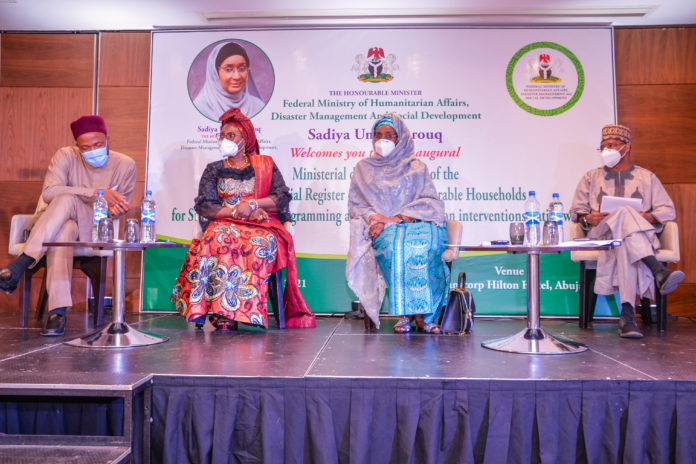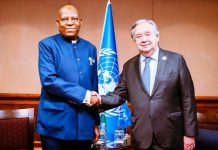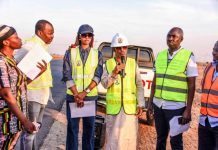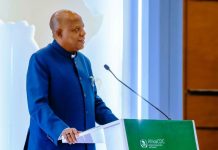
The Honourable Minister of Humanitarian Affairs , Disaster Management and Social development, Sadiya Umar Farouq, has announced that the National Social Register (NSR
She disclosed this at the first Ministerial Dialogue on the National Social Register in Abuja.
According to the Minister, “We welcome all MDAs and partners, to utilise the database of the poor and vulnerable Nigerians to support any effort that contribute to lifting people out of poverty.
“Because of the size of the database, Ministries of Health, Women Affairs, Labour and Employment, Education, Agriculture, Youth, and many MDAs would find relevant database for pro-poor interventions. Currently, some of the programmes under the European Union funding stream are accessing the NSR database for their interventions. The United Nations Development Fund (UNDP), United Nations Women (UN Women) have also mined this database for its interventions, similarly, the National Health Insurance Scheme has mandated all State Contributory Health Management Schemes to mine from the register for social insurance schemes.
“At the State level, Anambra, Lagos and Kaduna States have mandated all their Ministries to mine the database for their pro-poor interventions.
“As of 31st January 2021, out of the estimated 82.9 million (40.2 percent) Nigerians living below the poverty line, we have identified and registered 26.8 million poor and vulnerable individuals, equivalent to about 6.3 million households in our country. We are expecting another 20 million to be added to the database and held in the Rapid Response Register – a shock responsive intervention register, specifically targeted at urban informal workers impacted by the current COVID-19 pandemic. This database capacity is unprecedented in the history of our dear country.
Continuing, “In 2019, the National Bureau of Statistics estimated that 40.2% (equivalent to 82.9 million) Nigerians live below the poverty line on less than one dollar ninety cents (US$1.9), and another 10 million were expected to fall below the poverty as a result of the socio-economic impact of COVID-19 by the end of the year.
“The Federal Government of Nigeria (FGN), under the current administration, prioritized social protection (SP) interventions as a key strategy towards reducing poverty and addressing the effects of socio-economic vulnerabilities with two key instruments: the National Social Protection Policy (NSPP) – which is currently under review; and, the joint FGN-IDA/World Bank National Social Safety-Nets Project (NASSP) – all initiated in 2016. The FGN further established the Federal Ministry of Humanitarian Affairs, Disaster Management and Social Development in August of 2019, to institutionalize all its social investment programmes”.
The Minister said, ” the Social Register has coverage across the 36 States of the Federation and the FCT. We are in 601 LGAs out of the 774 LGAs in Nigeria. We have covered 7,320 wards, and 72,363 communities. This structure automatically provides the biggest database for any social inclusion or social protection intervention”.
She also reiterated that, ” the rich database in the NSR provides us the opportunity to easily coordinate the Sustainable Development Goals (SDGs), and achieve more effective coordination, documentary evidence of impact, and begin to bend and flatten the poverty curve in Nigeria”.
In his opening remarks, the Permanent Secretary of the Ministry, Bashir Nura Alkali stated that the NSR is an aggregated duplicate copy of States Social Registers.The register is built using a bottom-up community driven approach. The target method is designed to achieve the goal of identifying poor households correctly and efficiently.
The main target process uses approaches from geographic targeting to individual assesment to community -based targeting. The aggregation process starts from the community to the political wards, LGAS and State levels after due diligence. Duplicates of the state’s social register are kept at the Federal level and consolidated as NSR. The database are owned held by each state.
” The NSR is also designed to accommodate other forms of registers such as the Rapid Response Register (RRR) and the Unified Register of Beneficiaries as a subset. These other registers do not go through the same vigorous process as the NSR but use a uniform framework which will be used to expand the evidence- based beneficiaries of different interventionsand the economic movement of beneficiaries.
“NSR IS partof the on-going effort of the Ministry to cushion the socio-economic impact of poverty on human capital development, human security situation and the vicious circle of the economic implications of poverty. This effort is coordinated through the NASSCO in collaboration with the Wold bank” he said.
The International partners at the programme such as the United Nations Women, UNICEF, ILO, UNDP, and DFID testified to the accuracy and benefits of the NSR and pledged to support the Ministry in the expansion of the project.
Relevant MDAS who spoke at the event also promised to use the register for their various social interventions.
Present at the event were the Ministers of Women Affairs, Dame PaullenTallen, Youth and Sports, Sunday Dare, Minister of State Education, Emeka Nwajiuba,Labour and Employment, Dr.Chris. Ngige (virtual), Representative of the Secretary to the Government of the Federation, Andrew Adejo, Representative of the Minister of Communication and Digital Economy, National Coordinator, National Social Safety-Nets Coordinating Office (NASSCO), Apera Iorwa, among others.
Rhoda Ishaku Iliya
Deputy Director (Information)
February 16, 2021





